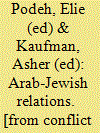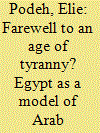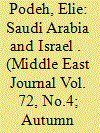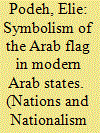|
|
|
Sort Order |
|
|
|
Items / Page
|
|
|
|
|
|
|
| Srl | Item |
| 1 |
ID:
071760


|
|
|
|
|
| Publication |
Portland, Sussex Academic Press, 2006.
|
| Description |
xiv, 386p.hbk
|
| Standard Number |
1903900689
|
|
|
|
|
|
|
|
|
|
|
|
Copies: C:1/I:0,R:0,Q:0
Circulation
| Accession# | Call# | Current Location | Status | Policy | Location |
| 051242 | 956.05/POD 051242 | Main | On Shelf | General | |
|
|
|
|
| 2 |
ID:
111717


|
|
|
|
|
| Publication |
2012.
|
| Summary/Abstract |
When Hosni Mubarak, looking out of a palace window, saw the demonstrators down below on January 25, 2011, he turned to his advisor and exclaimed: "My God! It's a revolt!" "No, my President," was the answer, "that is a revolution." Well, alright, this legendary quote is usually attributed to French King Louis XVI, on July 14, 1789.1 Yet, judging by the mild response of the Egyptian police forces it is possible that, like his European predecessor, Mubarak did indeed underestimate the significance of the events unfolding before his eyes. The parable draws our attention to the important distinction between a revolt, a takeover and a coup on the one hand, and a revolution on the other.
|
|
|
|
|
|
|
|
|
|
|
|
|
|
|
|
| 3 |
ID:
079978


|
|
|
|
|
| Publication |
2007.
|
| Summary/Abstract |
This essay maps the various Arab opinions regarding Turkey's possible accession to the European Union. The main argument is that most Arab leaders prefer to abstain from adopting a clear posture given the uncertainty surrounding the question. Arab intellectuals, in general, tend to support Turkey's accession, while at the same time they express some skepticism with regard to European willingness to actually admit Turkey to the EU. Arab discourse, however, also reflects the fears of a society concerned with the possible erosion of Turkey's Islamic identity as a result of its accession to the EU and implications of that for the Arab world. By evading the issue of Turkey's accession to the EU, Arab and Islamic elites are making a serious mistake. Whether the EU is going to admit Turkey or reject its membership, the ramifications for the Arab world will be significant. Therefore, the leaders of the Arab states should be advised to begin seriously addressing this question
|
|
|
|
|
|
|
|
|
|
|
|
|
|
|
|
| 4 |
ID:
134687


|
|
|
|
|
| Summary/Abstract |
The Arab League Summit in Beirut on March 27/28, 2002, adopted an initiative to resolve the Arab-Israeli conflict. The Arab Peace Initiative (Mubadarat al-Salam al-‘Arabiyya), as it soon became known, was a modified version of a Saudi initiative, and was first unveiled in an interview of Crown Prince ‘Abdullah of Saudi Arabia by American journalist Thomas Friedman, on February 17 of that year. Israel learned of the API at the height of the second Palestinian uprising, the al-Aqsa Intifada, and therefore it did not elicit a serious response. However, it remained on the Arab League agenda ever since, regularly reaffirmed by successive league summits. In other words, the API has been an available policy option for more than a decade, yet no Israeli government has embraced it as a viable peace option.
|
|
|
|
|
|
|
|
|
|
|
|
|
|
|
|
| 5 |
ID:
163604


|
|
|
|
|
| Summary/Abstract |
Media reports have recently indicated that Israel and Saudi Arabia have been cooperating behind the scenes against their common enemies, Iran and jihadist groups. This article sets to explore the rationale behind and essence of this cooperation, while putting it in proper historical perspective. The article shows that Saudi policy toward Israel was consistently dictated by pragmatism rather than ideology, while Israel’s suspicions toward the kingdom disappeared only following the 2006 Lebanon War and the Arab Spring.
|
|
|
|
|
|
|
|
|
|
|
|
|
|
|
|
| 6 |
ID:
104119


|
|
|
|
|
| Publication |
2011.
|
| Summary/Abstract |
The national flag, anthem and emblem are the three symbols through which an independent country proclaims its identity and sovereignty. Although each state has its distinctive flag, there are similarities in the flags of certain countries, such as in Scandinavia (the cross) and Africa (colours). These symbolise certain propinquity in terms of ideology, culture and history. Similarity is also to be found in the flags of the Arab countries: out of the twenty-two current members of the Arab League, ten share the same colours on their flags (green, white, black and red), while a certain Islamic symbol (eagle, star) in some flags represents the uniqueness of that country. Of the other twelve countries, most rely on one colour of the four (usually red or green) while nine use Islamic symbols (stars, crescent and sword) on their flags. In spite of the importance of this national symbol, the study of the modern Arab flag is almost non-existent. This article explores the modern evolution of the Arab flag and the reasons for the similarities in many Arab flags. In particular, it will deal with the pan-Arab flags of the Hashemites Kingdom of the Hijaz (1916-26), Jordan, Iraq, Palestine, Syria and Egypt.
|
|
|
|
|
|
|
|
|
|
|
|
|
|
|
|
|
|
|
|
|